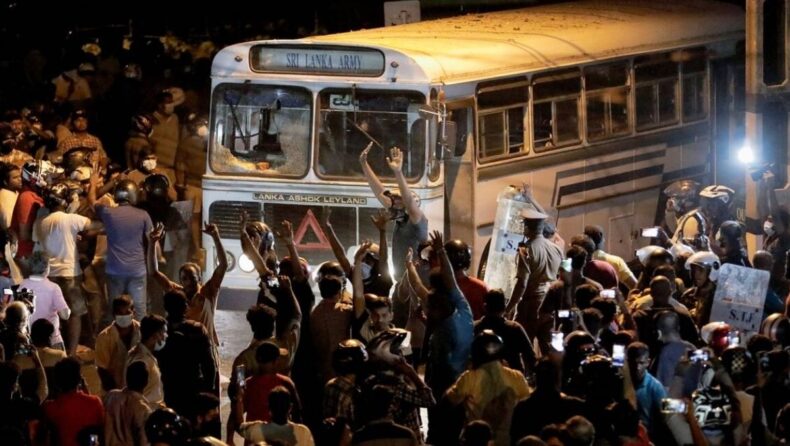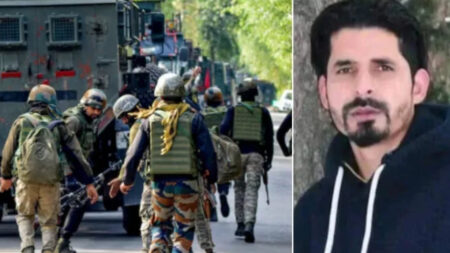Armed forces in the island nation of Sri Lanka blocked a march organised by the protesters which defied a weekend curfew. The march was organised to protest Sri Lanka’s deteriorating economic condition after authorities enforced a social media blackout to suppress public dissent.
The South Asian country is facing severe shortages of multiple resources such as food, fuel, and other essentials, along with record-breaking inflation and crippling power cuts. One of the worst downturns the nation has seen since its independence from Britain in 1948,
Protests organised by opposition leaders in Colombo on Sunday amid a curfew
The Sri Lankan President, Gotabaya Rajapaksa, imposed a state of emergency on Friday. The emergency was imposed a day after a mob attempted to storm the presidential home in the capital city of Colombo. The nationwide curfew will stay in effect until Monday morning.
Sri Lanka’s primary opposition alliance, Samagi Jana Balawegaya (SJB), denounced the social media blackout, which was aimed at alleviating the intensifying public protests and declared it was time for the government to step down.
Armed with automatic assault rifles, the troops moved to stop an opposition rally. Lawmakers and supporters of the opposition alliances were a part of the protesters. They were attempting to march to Independence Square in the capital.
The road was blocked by barricades a few hundred metres from the residence of an opposition leader, Sajith Premadasa. The protesters engaged in a tense stand-off with the security forces for around two hours before dispersing peacefully.
“President Rajapaksa better realise that the tide has already turned on his autocratic rule,” said Harsha de Silva, a lawmaker of the SJB, while speaking to AFP at the rally. Another SJB legislator, Eran Wickramaratne, criticised the declaration of the state of emergency and the presence of armed troops in the streets of Sri Lanka’s capital city.
“We can’t allow a military takeover,” he said. “They should know we are still a democracy.”
As fuel prices continue to rise with no relief in sight, social media platforms have been forced to shut down
The social media platforms such as Facebook, YouTube, Titter, Instagram, and WhatsApp were among the applications that were shut down on Sunday following orders from the defence authorities, the internet service providers told their subscribers.
Reports published by private media outlets in Sri Lanka stated that the chief of the nation’s Internet regulator resigned after the order went into effect. The streets of Colombo remained empty for the most part on Sunday, if not for the opposition’s protest and the long queues of vehicles outside fuel stations.
Mass demonstrations had been called on social media before the ban went into effect. Organisers of the protests have since postponed the rallies until after the state of emergency is lifted on Monday. Despite the curfew, small crowds held peaceful protests across Colombo, all of which were disbanded without any major incidents.
Social media activists are arrested as the government tries to shut down any form of dissent
The state of emergency has given way to the emergence of cracks in the government. The president’s nephew, Namal Rajapaksa, has called the curfew “completely useless” and announced that he had urged the administration to reconsider the blackout.
“I will never condone the blocking of social media,” said Namal, who is also the sports minister of the island nation. “The availability of VPNs, just like I’m using now, makes such bans completely useless.”
On Twitter and Facebook, anti-government hashtags such as “# GoHomeRajapaksas” and “# GottaGoHome” have been trending for days.A social media activist was arrested on Friday for allegedly posting content that could cause unrest among the public. He has been bailed out.
Hundreds of lawyers have stepped up to represent anti-government protesters who are being arrested by Sri Lanka’s authorities. The Bar Association in Sri Lanka, which has a lot of influence, has urged the government to rescind the curfew.
Foreign diplomats express concern over the situation in Sri Lanka
Diplomats from western nations have expressed concerns over the unjust use of an emergency to stifle public dissent and said they were closely monitoring developments. Protesters staged halfway across the world in Melbourne, Australia in solidarity. Melbourne is home to a large Sri Lankan population.
A serious lack of foreign currency has left the island nation battling to service its rapidly inflating $51 billion foreign debt. The condition has worsened due to the pandemic, which led to a shocking decrease in the revenue Sri Lanka gets from tourism and remittances.
The economic crisis is so dire that the import-dependent country is now unable to pay even for essentials. Outrage caused shortages of diesel have sparked across Sri Lanka over the past few days.
Protesters are doing protests at empty pump stations, and electricity utilities have enforced blackouts that last 13 hours in order to conserve fuel. Economists across the world have attributed the crisis to government mismanagement, decades of accumulated borrowing, and ill-advised tax cuts.
The nation is negotiating with the International Monetary Fund in hopes of a bailout.
Published by – Kiruthiga K
Edited by – Kritika Kashyap













